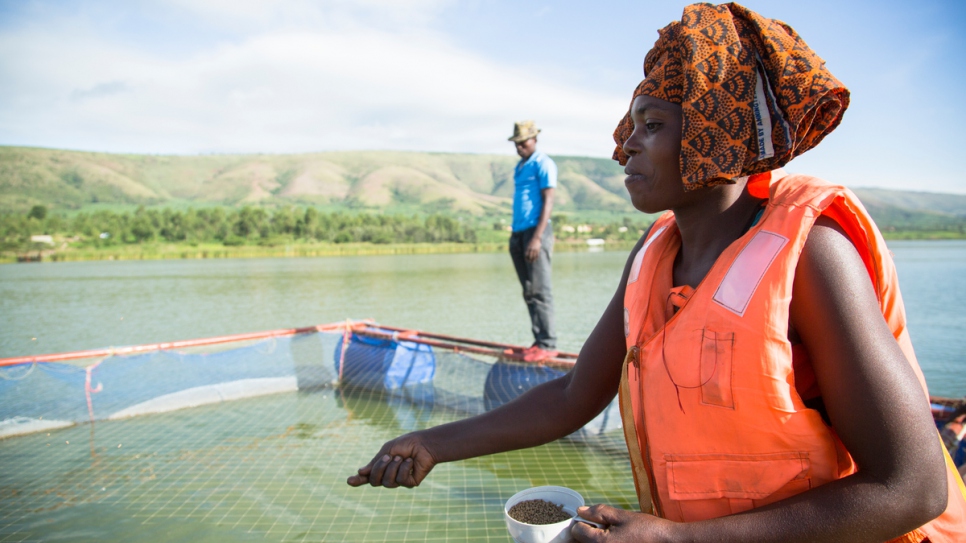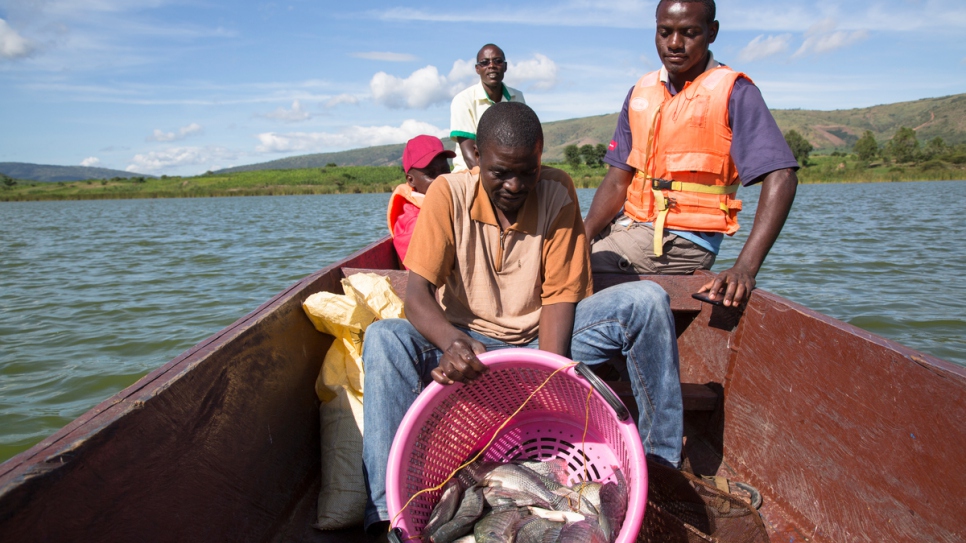Fish farm nets benefits for Congolese refugees and Ugandan hosts
Lake Rwamunga fish farming association allows its 25 members to earn a living, save regularly and then borrow funds to finance their own livelihoods projects.
Congolese refugee Janine lays white tilapia on a stall by lake Oruchinga waiting for local buyers to arrive.
© UNHCR/Rocco Nuri
Janine puts on a life vest, ties a scarf around her head and jumps into a small boat with the captain and two young men. The vessel cuts through the still water at a slow speed, leaving a silky wake.
After a short ride across Lake Rwamunga, in western Uganda, the captain pulls over near a floating net cage and turns off the engine. Janine loosens the bag beneath her seat, scoops out a cup of brown pellets and scatters them on the water. Soon, a shoal of white tilapia breaks the surface to feed. With a large net, she scoops up 40 fish before heading back to shore.
A refugee from the Democratic Republic of the Congo, 32-year-old Janine is a member of a village fish farming association. Established a year ago with the help of UNHCR, the UN Refugee Agency, and UNDP, the UN Development Programme, it brings refugees and locals together in Uganda around the common goal of making a living.
“The UN gave us the nets, cages and training. We offered our time and commitment.”
“The UN gave us the nets, cages and training,” says Janine with conviction. “We offered our time and commitment.”
The group receives business training, emphasizing savings and loan best practices. Technical support, including how to produce low-cost fish food pellets and other innovative ideas, is provided.
Village savings and loan associations like the fish farm group on the shores of Lake Rwamunga have multiplied in Uganda in the past decade, providing simple savings and loan facilities to communities that do not have easy access to formal financial services.
Each group, normally composed of farmers and animal breeders, has 15 to 25 members who meet and save regularly by buying shares. Savings are also put towards a loan fund, from which members can borrow money to start their own businesses.
The fish farming association is made up of 20 refugees from Oruchinga settlement and five Ugandans from a nearby village. They take turns every day to feed and harvest the fish, and sell the day’s catch. The group keeps a book to record withdrawals and deposits made by the members, including payment of individual shares towards the loan fund, and loan requests.
Savings book in her hands, a Ugandan member of the association, Aisha, keeps record of the transactions with villagers as they buy the fish. Within minutes, all the fish are gone. “It was a good day,” she says as she deposits the day’s income in the group’s cash box.
A single mother of two, she joined the group nearly a year ago. “I was in a very bad situation then. I could not even afford a bar of soap for my children, let alone buy food,” she says, her gaze fixed on the ground. A regular saver with the association, she was subsequently able to take out a loan and open a small restaurant.
“Now that I have a job and the restaurant, I feel like a free person,” she adds with a smile. “My life has changed within months. I am able to buy food for my children, pay for their education and settle my rent every month without delay.”
Janine, a single mother with two children and elderly parents to look after, also benefits from the programme. After paying in to the association for a period, she got her first loan six months ago to build a new house.
“I was ashamed to have my parents live in that old hut,” she says, pointing to a large crack running across the side of one wall of her old home. “But that’s a big project … and for a big project, one needs a lot of money.”
She started small, with a US$30 loan. She bought a pregnant pig and within weeks was able to sell seven piglets. “By then, I had enough money to pay for construction materials and labour. My dream was at my fingertips,” she says.
"I had enough money to pay for construction materials and labour. My dream was at my fingertips."
By ensuring both the refugees and their hosts benefit, the savings and loan programme in Uganda is part of a new response to displacement that is gaining traction worldwide.
Last year’s New York Declaration endorsed by all 193 member states of the United Nations reinforced the need to enhance refugee self-reliance through a ‘whole-of-society’ approach as a pre-requisite to fully realize a refugee response that is comprehensive and sustainable.
“Everyone has a role to play,” says Bornwell Kantande, UNHCR’s representative in Uganda. “Once we tap into outside expertise and innovative partnerships, we can make a difference and help refugees become more (like) entrepreneurs, consumers and business partners and less (like) beneficiaries.”
For her part, Janine is working hard to build on her achievements, and is already dreaming of the future.
“I want to turn my house into a crop store for local farmers,” she says. “If I make enough money, I will buy myself a car and drive around like everyone else.”





